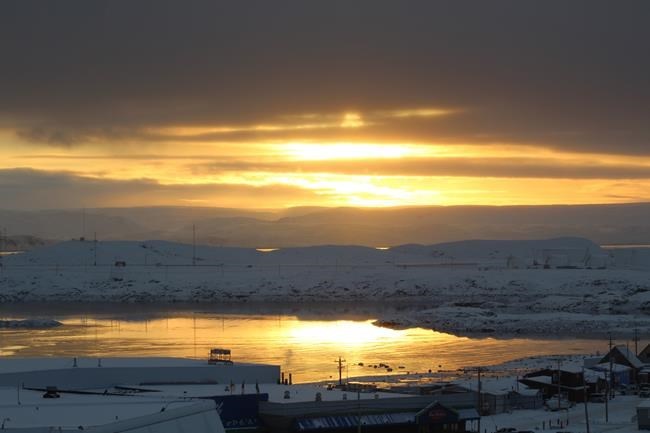IQALUIT, Nunavut — The Nunavut government has released a long-term plan that it says will work toward treating COVID-19 like any other vaccine-preventable disease in the territory.Â
The plan, which is called Nunavut's Path: Living with COVID-19, outlines the steps needed to gradually reduce and eventually eliminate public health restrictions in Nunavut.
"The virus is now a vaccine preventable disease that no longer requires immediate community shutdowns, drastic public health measures, or a complete change to our way of life," the document says.Â
The plan looks at how public health restrictions would be increased or eased based on the percentage of people vaccinated in a community, the status of COVID-19 in Nunavut, the status of COVID-19 and vaccination rates in neighbouring jurisdictions, testing and response capacity, and variants of concern.
For example, any community with a vaccination rate of 75 per cent or higher will have fewer restrictions in response to cases of COVID-19, while communities where 49 per cent or less of the population is vaccinated will have tighter restrictions.
"While the public health emergency remains in place, confirmed cases of COVID-19 will not trigger an automatic lock down and the implementation of the strictest public health measures," the document says.
The plan will move Nunavut from restrictions to what it calls "baseline measures," which it says are the lowest level of restrictions still needed in the territory to reduce the risk of introduction of the virus. The measures will be assessed every two to four weeks, says the document.Â
Right now, baseline measures include limiting household gatherings to 15 people and opening restaurants and bars at 75 per cent capacity. As of July 30, masks were no longer mandatory in Nunavut but their use is still strongly encouraged.Â
The plan says the ultimate goal is to end the territory's public health emergency, which has been in place for more than a year, and eliminate all public health restrictions.Â
In a news release, chief public health officer Dr. Michael Patterson said Nunavut's response to the pandemic, including testing capacity and access to vaccines, lets Nunavut start to change how it lives with COVID-19.
"While certain risks remain, we are no longer as limited in our options or in the choices we make to keep Nunavummiut safe," Patterson said.Â
Since mid-June, fully vaccinated travelers have been able to fly into Nunavut without isolating. Non-vaccinated individuals still need to isolate in one of the territory's designated isolation hotels in southern Canada.
For now, all schools in Nunavut also plan to reopen at full capacity for in-class learning this fall.Â
It has been nearly two months since Nunavut's last active case of COVID-19 and about 66 per cent of its population older than 12 is now fully vaccinated.
There have been 657 cases of COVID-19 and four deaths in Nunavut, a territory of about 40,000 people, since the pandemic began.
This report by The Canadian Press was first published Aug. 3, 2021.Â
---
This story was produced with the financial assistance of the Facebook and Canadian Press News Fellowship.
Emma Tranter, The Canadian Press

